
An ecovillage is a traditional or intentional community with the goal of becoming more socially, culturally, economically, and/or ecologically sustainable. An ecovillage strives to produce the least possible negative impact on the natural environment through intentional physical design and resident behavior choices. It is consciously designed through locally owned, participatory processes to regenerate and restore its social and natural environments. Most range from a population of 50 to 250 individuals, although some are smaller, and traditional ecovillages are often much larger. Larger ecovillages often exist as networks of smaller sub-communities. Some ecovillages have grown through like-minded individuals, families, or other small groups—who are not members, at least at the outset—settling on the ecovillage's periphery and participating de facto in the community.

Cohousing is an intentional community of private homes clustered around shared space. The term originated in Denmark in late 1960s. Each attached or single family home has traditional amenities, including a private kitchen. Shared spaces typically feature a common house, which may include a large kitchen and dining area, laundry, and recreational spaces. Shared outdoor space may include parking, walkways, open space, and gardens. Neighbors also share resources like tools and lawnmowers.

An intentional community is a voluntary residential community designed from the start to have a high degree of social cohesion and teamwork. The members of an intentional community typically hold a common social, political, religious, or spiritual vision, often follow an alternative lifestyle and typically share responsibilities and property. Intentional communities can be seen as social experiments or communal experiments. The multitude of intentional communities includes collective households, cohousing communities, coliving, ecovillages, monasteries, survivalist retreats, kibbutzim, hutterites, ashrams, and housing cooperatives.
The Global Ecovillage Network (GEN) is a global association of people and communities (ecovillages) dedicated to living "sustainable plus" lives by restoring the land and adding more to the environment than is taken. Network members share ideas and information, transfer technologies and develop cultural and educational exchanges.
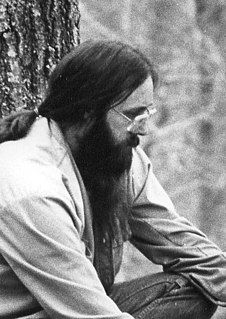
Albert Kealiinui Bates is a member of the intentional community and ecovillage movements. A lawyer, author and teacher, he has been director of the Global Village Institute for Appropriate Technology since 1984 and of the Ecovillage Training Center at The Farm in Summertown, Tennessee, since 1994.

The Foundation for Intentional Community (FIC), formerly the Fellowship of Intentional Communities then the Fellowship for Intentional Community, provides publications, referrals, support services, and "sharing opportunities" for a wide range of intentional communities, cohousing groups, ecovillages, community networks, support organizations, and people seeking a home in community. The FIC is a nonprofit 501(c)(3) organization in the United States.

Sunward Cohousing is an intentional community located in Ann Arbor, Michigan, USA. Sunward's founders were pioneers in bringing the cohousing model to Michigan.
Cobb Hill is an intentional community in Hartland, Vermont in the United States. Its design borrows from other community, agricultural, and environmental action models: cohousing, ecovillages, sustainable communities, community-supported agriculture (CSA), agricultural collectives, sustainability research and action organizations.
The following outline is provided as an overview of topics relating to community.
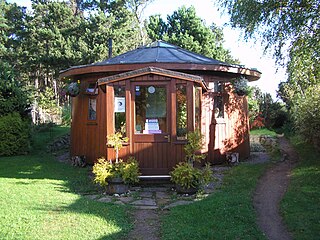
Findhorn Ecovillage is an experimental architectural community project based at The Park, in Moray, Scotland, near the village of Findhorn. The project's main aim is to demonstrate a sustainable development in environmental, social, and economic terms. Work began in the early 1980s under the auspices of the Findhorn Foundation but now includes a wide diversity of organisations and activities. Numerous different ecological techniques are in use, and the project has won a variety of awards, including the UN-Habitat Best Practice Designation in 1998.
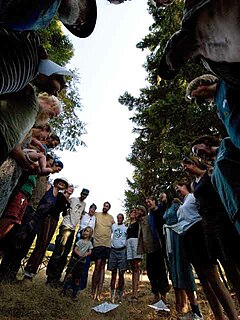
Diana Leafe Christian is an author, former editor of Communities magazine, and nationwide speaker and workshop presenter on starting new ecovillages, on sustainability, on building communities, and on governance by sociocracy. She lives in an off-grid homestead at Earthaven Ecovillage in the Blue Ridge Mountains of North Carolina, U.S. She has said that living in an intentional community "is the longest, most expensive, personal growth workshop you will ever take."

The Communities Directory, A Comprehensive Guide to Intentional Community provides listing of intentional communities primarily from North America but also from around the world. The Communities Directory has both an and a print edition, which is published based on data from the website.
Diggers and Dreamers: The Guide to Communal Living is a primary resource for information, issues, and ideas about intentional communities in England, Scotland, Wales and Northern Ireland – from urban co-ops to cohousing groups to rural communes and low impact developments.

The Yarrow Ecovillage is an intentional community in Yarrow, British Columbia, Canada. Yarrow is a settlement of 3,000 population within the municipal boundaries of Chilliwack, British Columbia. The Ecovillage is a member-designed community that aims to achieve a more socially, ecologically and economically sustainable way of life. The Ecovillage's master plan for the 10-hectare (25-acre) former dairy farm, foresaw three main legal entities: An 8-hectare (20-acre) organic farm, a 31-unit multigenerational cohousing community, and a mixed-use development with just under 2800 m2 of commercial space, a 17-unit senior cohousing community and a learning centre.

Philip Joseph Zuckerman is a professor of sociology and secular studies at Pitzer College in Claremont, California. He specializes in the sociology of substantial secularity. He is the author of several books, including Living the Secular Life (2014), What It Means to be Moral (2019) and Society Without God (2008) for which he won ForeWord Magazine's silver book of the year award, and Faith No More (2011).
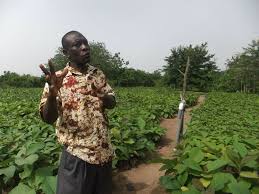
Paul Yeboah, (1970-2021) was an educator, farmer, permaculturist, community developer, and social entrepreneur. He is the founder and coordinator of the Ghana Permaculture Institute and Network in Techiman, Ghana, West Africa. It is located in the Brong-Ahafo Region of Ghana. The purpose of the Institute is to build and maintain a stable food system, to take care of the local ecosystems, and to improve the quality of life in the rural areas. The GPN trains students and community in sustainable ecological farming techniques. They support projects throughout Ghana; women groups, micro-finance projects; teach growing moringa; mushroom production; alley cropping, food forests development and Agroforestry.
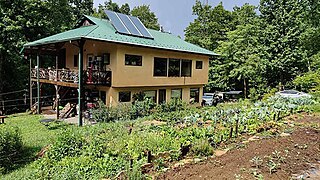
Earthaven is an ecovillage in Western North Carolina, about 50 minutes from Asheville.
Kathryn "Katie" McCamant is an American architect and author based in Nevada City, California. She is known for her work developing the concept of cohousing in the United States, including authoring two books on the topic. She and her partner Charles Durrett designed more than 55 cohousing communities across the United States.
Ecovillages in China are typically rural communities designed to promote ecological, cultural, economic and social sustainability in concert with the natural environment of a particular area. These are small human settlements with a community-based approach designed by the community themselves. Ecovillages are not completely isolated from other settlements, although they aspire to increased self-sufficiency.












